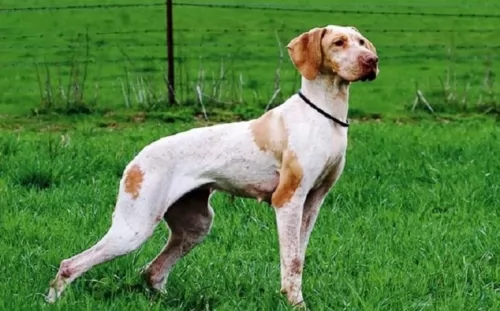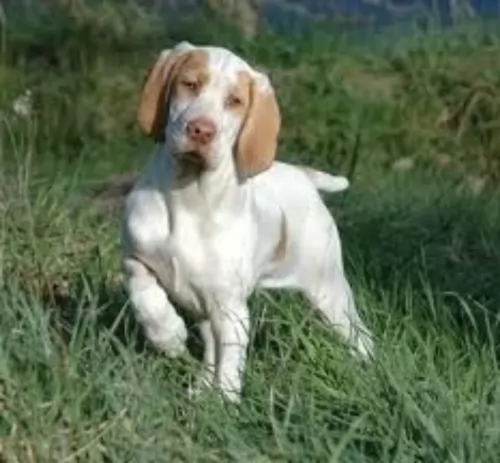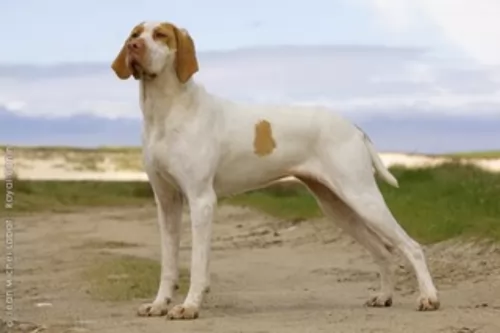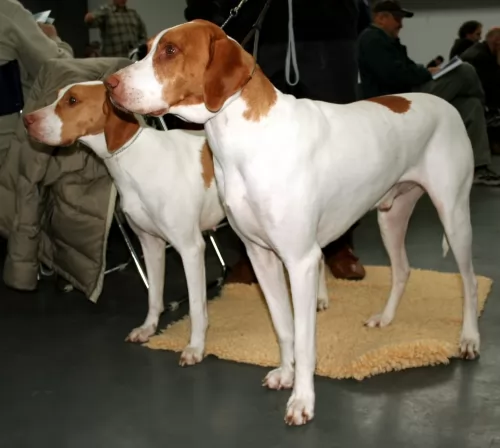 Petzlover
Petzlover Ariege Pointer is originated from France but Puggle is originated from United States. Ariege Pointer may grow 29 cm / 12 inches higher than Puggle. Ariege Pointer may weigh 17 kg / 38 pounds more than Puggle. Both Ariege Pointer and Puggle has same life span. Both Ariege Pointer and Puggle has almost same litter size. Ariege Pointer requires Low Maintenance. But Puggle requires Moderate Maintenance
Ariege Pointer is originated from France but Puggle is originated from United States. Ariege Pointer may grow 29 cm / 12 inches higher than Puggle. Ariege Pointer may weigh 17 kg / 38 pounds more than Puggle. Both Ariege Pointer and Puggle has same life span. Both Ariege Pointer and Puggle has almost same litter size. Ariege Pointer requires Low Maintenance. But Puggle requires Moderate Maintenance
 The Ariege Pointer is a French hunting dog, coming from the Ariegeois region of France.
The Ariege Pointer is a French hunting dog, coming from the Ariegeois region of France.
Known as the Ariege Pointing Dog, French Pointer or Braque de l’Ariege, these dogs came from the old French Braque dogs that were crossed with the orange and white Southern Braques.
It was in 1990 that a team of breeders decided to devote themselves to the breed’s survival. The Braque de l’Ariege was recognized by the United Kennel Club in 2006.
 The first Puggle was bred in the United States in the 1980s and was registered with the American Canine Hybrid Club.
The first Puggle was bred in the United States in the 1980s and was registered with the American Canine Hybrid Club.
None of the major kennel clubs recognize Puggles as a dog breed. The Puggle is a mix between the Pug and the Beagle, and is essentially a companion dog. Both the parent dogs are popular pets and each of the dogs - the Pug and the Beagle have their own histories.
 The Ariege Pointer has always been a dog kept essentially for hunting and not as a companion dog. He stands between 55 – 67cm and weighs 25 – 30kg.
The Ariege Pointer has always been a dog kept essentially for hunting and not as a companion dog. He stands between 55 – 67cm and weighs 25 – 30kg.
He is an attractive looking dog with quite a large head while the body is sleek and slender to look at. The ears are quite large and are floppy while the tail is traditionally docked to give him that distinctive look. These days the tail is often left long and hangs downwards.
The coat is short, single and rough and is white with tan or orange patches. The coat can also be speckled or ticked.
The Ariege Pointer is a hunting dog who is friendly towards strangers and therefore won’t make a particularly good watchdog.
These dog are lively, independent and good natured and they make excellent companion dogs. They are fairly docile and and get on well with children and pets in the home. Just like with any other dog, they need to be trained and socialized early.
 The Puggle isn’t a purebred and he has short legs, a fairly thickset body, a crooked tail and medium length, floppy ears.
The Puggle isn’t a purebred and he has short legs, a fairly thickset body, a crooked tail and medium length, floppy ears.
The Puggle’s coat is short and smooth and the colors can be anything between fawn, white, tan with bi-coloring such as black and white or even tri-colored such as white, black and tan.
He may have the black mask like the Pug has or he may not. He stands in height between 25-38cm and weighs between 4 and 13kg.
The Puggle brings fun and games into every household with his bright, sociable personality. He gets on well with children and other dogs and makes a splendid pet and friend.
He is intelligent, albeit a bit stubborn too, but you can teach him some simple commands such as sit, stay and lie down. They are dogs which can adapt well to life in the city or in the countryside.
 The Ariege Pointer has always been an excellent pointing- and hunting dog. When it comes to being a family pet, he puts his hunting skills aside and becomes a loyal, loving, friendly pet.
The Ariege Pointer has always been an excellent pointing- and hunting dog. When it comes to being a family pet, he puts his hunting skills aside and becomes a loyal, loving, friendly pet.
They are considered to be rare dogs, and were at one time bordering on extinction. Those who have owned one of these hunting dogs will be glad to know that they are no longer considered endangered. They’re not your friendly, social kind of dog that you find in other dog breeds, but with training and socialization he will make a fine companion and family friend.
 Puggles are lively dogs who are always up for a game. They are affectionate and loving towards their human family and get on well with strangers too.
Puggles are lively dogs who are always up for a game. They are affectionate and loving towards their human family and get on well with strangers too.
They’re the kind of dogs who love a game outside but then are more than happy to cozy up on the couch with you.
Puggles love the attention of their family members and in exchange for your attention he is willing to shower you with his companionship and devotion.
 The Ariege Pointer is a working dog breed, used for hunting and retrieving prey. With good care the dog can live to be a good 12 – 15 years of age.
The Ariege Pointer is a working dog breed, used for hunting and retrieving prey. With good care the dog can live to be a good 12 – 15 years of age.
However, with every dog breed there are common dog diseases to watch for. This dog has long floppy ears and these can get damp and will need to be cleaned and dried regularly otherwise the long ears can be prone to infection.
Apart from being prone to health issues such as an ear infection, you want to be aware of very common dog ailments such as hip dysplasia which can cause lameness in your dog.
Whatever illness your dog has, and you see he isn’t acting his usual self, get him to the vet for a check-up and then make sure that all treatment and medication prescribed is adhered to.
 Your Puggle isn’t likely to get sick often if you feed him healthy food, you exercise him and provide him with a loving, caring home. However, every dog can become ill, and Puggles can battle with the likes of Cherry Eye, skin problems and Hip Dysplasia among other ailments too.
Your Puggle isn’t likely to get sick often if you feed him healthy food, you exercise him and provide him with a loving, caring home. However, every dog can become ill, and Puggles can battle with the likes of Cherry Eye, skin problems and Hip Dysplasia among other ailments too.
Because of the Pug being a brachycephalic breed, your Puggle might also battle with respiratory problems.
Hip Dysplasia is a common canine disease that has no respect for age or breed of dog. Even young dogs can develop this heritable condition where the thighbone doesn't fit properly into the hip joint. Dog have pain in one or both of the rear legs, and can become totally lame. Arthritis can also develop.
This is when the gland in the dog’s third eyelid bulges out as a red mass. It can be treated surgically.
 Your attractive Ariege Pointer will give birth to 2 – 8 puppies. If you don’t want puppies, then spaying or neutering is excellent and can actually have many health benefits for your pet.
Your attractive Ariege Pointer will give birth to 2 – 8 puppies. If you don’t want puppies, then spaying or neutering is excellent and can actually have many health benefits for your pet.
This dog with its short coat requires very little maintenance, and a good brush twice a week will ensure the coat remains glossy and shiny, giving you the chance to also check for fleas and ticks.
Don’t just assume every dog has bad breath. Bad breath can be indicative of dental disease, and dental problems can cause all kinds of other illnesses within the body. Make sure that while your pet’s teeth are healthy, that you brush them 2 or 3 times a week with special canine toothbrush and toothpaste.
The Ariege Pointer requires regular exercise as it is a lively, energetic dog. He can adapt to life in the city or the country, but ideally he needs a place with a large garden.
Wherever you keep him as a pet, make sure you take him for walks every day and that you play ball- or rope games with him. Ignoring his exercise needs will turn him into a bored, frustrated pet, and that isn’t fair towards him.
Make sure you choose good quality commercially manufactured foods for him. Adding in some home-made food to his kibble such as cooked brown rice, vegetables and chicken will be wonderfully good for him.
Every dog will require some raw meat added into his diet from time to time. Many skin diseases can be treated by adding in raw meat. After all, before dogs were domesticated they lived on raw meat, and including this ingredient back into their diet guarantees to make a remarkable difference in terms of good health.
 The Puggle can settle into life in the city or the countryside as he doesn’t require too much exercise. That doesn’t mean however that you can just ignore his exercise needs, as doing so can make him overweight and unfit.
The Puggle can settle into life in the city or the countryside as he doesn’t require too much exercise. That doesn’t mean however that you can just ignore his exercise needs, as doing so can make him overweight and unfit.
Take him for walks and play games with him indoors as well as outdoors.
The Puggle, with his short-haired coat, is a low maintenance dog that is easy-to-groom. A good brush twice a week will be excellent for him.
A brushing session gives you a chance to look inside his ears for signs of redness and ear infections, to look at his eyes and have a good look inside his mouth. Bad teeth can cause pain but can also cause illness throughout the body.
Trim your dog's claws as well, because left too long they can hook on things and rip the flesh.
Our canine children rely on us for good food to stay healthy. Luckily, for convenience sake, there are excellent commercially manufactured dog foods on the market. The best ones ensure that your dog gets a good balance of vitamins and minerals.
However, you want to also provide your pet with some tasty home-made food too. Dogs thrive on simplicity and consistency, and home-cooked food twice a week and added to the dry kibble can keep him healthy and thrilled with his lot.
Boiled chicken, sweet potatoes, brown rice or pasta, carrots and spinach will be excellent for him – it is simple just as he likes it and it is nutritious. Chop the food up finely and add it into the dry kibble. Also, your Puggle will do well on some raw meat occasionally too as this keeps the skin free of rashes and free of infections.
Make sure he is never without a constant supply of fresh, cool water.